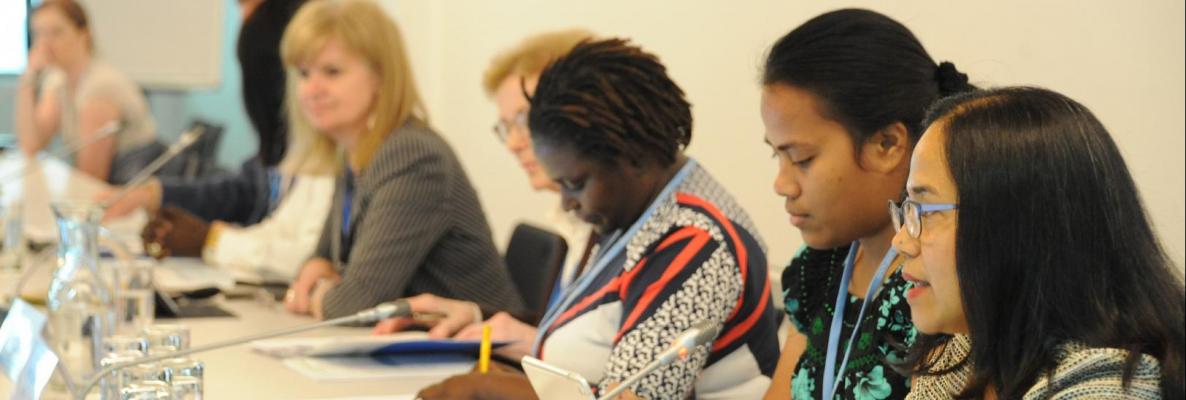On the 9th of May 2018 Mary Robinson participated in Part 2 of the annual In-session Workshop on Gender and Climate Change at the Bonn Intersessional, which focused on Policies, plans and progress in enhancing gender balance in national delegations. Chaired by Penda Kante Thiam (Senegal) and Colin O’Hehir (Ireland) the workshop is mandated by the Gender Action Plan (GAP) adopted at COP23.
Setting the scene for the discussions Fleur Newman, Gender Focal Officer at the UNFCCC Secretariat, presented the key technical paper on the Secretariat’s behalf, which focused on achieving gender balance. Following this, two participants of the Women’s Delegates Fund (WDF) Stella Gama (Malawi) and Chrisda Kaeti (Kiribati) spoke to their experiences of the initiative. Ms Gamma highlighted the fact that there are still major differences in opportunities for men and women in participating in climate action and drew attention to the measures identified in the Mary Robinson Foundation – Climate Justice and UN Women research The Full View Second Edition; Ensuring a comprehensive approach to achieve the goal of gender balance in the UNFCCC process, which would, if implemented, improve the opportunities for women. Ms Kaeti, a recent participant in the WDF training, highlighted the importance of networking and the exchange of ideas with women from the Pacific region. Verona Collantes-Lebale Intergovernmental Specialist with UN Women and Mariana Duarte Mutzenburg, International Parliamentary Union, both provided experiences and actions from other international processes on enhancing gender balance.
Mary Robinson then moderated a discussion on experience with policies and plans. Opening the discussion Mrs Robinson highlighted that fact that the percentage of women delegates at the last three COPs remained static at approximately 30% and that this session provided an opportunity to identify practical actions that Parties can take to accelerate progress towards the goal of gender balance in national delegations.
A short panel discussion then followed to provide some thoughts for the group discussions. Dawn Pritchard, a representative of the Métis Nation – Saskatchewan, shared her experience of being a grassroots participant in the Canadian delegation. She highlighted the need for capacity building and training to be able to effectively engage in all the discussions not just those specific to gender and indigenous people. Una May Gordon who is from the Ministry of Economic Growth & Job Creation, Jamaica shared her experience of increasing women’s participation in the political sphere. Ms Gordon reminded participants that “women’s participation is not just a moral obligation but a practical one also” and that women’s greater participation leads to better development results. The panel’s final speaker was Hamid Abakar Souleymane, Head of Delegation for Chad. Mr Souleymane highlighted the targets set by the Chadian government in relation to gender balance and the fact that two of the five members of the delegation were women.
Following the panel participants joined one of five breakout groups to discuss the following topics;
Topic 1: Capacity-building and awareness-raising
Topic 2: Networking and sharing experience
Topic 3: Funding
Topic 4: Temporary special measures
Topic 5: Policies and measures
Rapporteurs from the breakout groups provided a range of ideas and suggestions many of these reflected the measures included in the technical paper. All the groups identified the importance of capacity building to enable meaningful engagement and stressed the importance of funding for capacity building to enable equal participation in UNFCCC processes. Sashagay Middleton from Antigua and Barbuda reminded negotiators present of the importance of including the voice of grassroots people, telling participants “that you can’t come to negotiations and not ask us what it’s about”. Participants also noted the need to address broader structural inequalities if we are to address the gender imbalance within delegations, it was noted that New Zealand’s delegation was comprised of 75% women at the intersessional this was not necessarily as a result of specific measures, but rather reflected a more equal society.
Summing up the discussion Ms Kante Thiam highlighted that there were many ideas generated by the rich discussion that could be taken forward, but that there was also a need to act collectively if we are to achieve gender balance in the national delegations.
Related Links
Our Work on Gender and Climate Change
Gender and Climate Change UN Climate Change
View the On Demand Webcast Gender in-session workshop – Part 2


